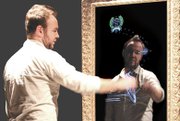Mirror, Mirror on the Wall
An international fashion-house consulting firm partners with Avery Dennison to bring you the latest technology to a store near you
We’ve all looked into the mirror and dreamt about seeing something different. Soon, at a retailer near you, you’ll be seeing more than just the reflection of your own perfectly imperfect self.
MagicMirror is a new, interactive mirror that gives retailers ample opportunity for upselling and customer satisfaction. The Big Space, a Milan, Italy–based marketing consulting firm that specializes in using technology to create ambiance in retail environments, developed the mirror.
Dick Lockard—an American native who boasts a background in fashion design, advertising and Internet consulting—founded the company in 2000. At The Big Space, he combines his taste for modern design and tech savvy to create an exceptional retail experience on behalf of his high-profile clientele. “We create an experience for shoppers so you feel something, and we design what that something is, so that when you walk into Prada, it feels like Prada,” he says.
In addition to Prada, The Big Space’s clients include Ralph Lauren, Levi’s and Le Coq Sportif.
The Big Space unveiled MagicMirror in January 2007. The product utilizes radio-frequency identification (RFID) technology, the technology behind “smart tags,” the new generation of retail hangtags. “Because of our focus on creating consumer experiences, we just thought it was a great technology to use to trigger an experience and add value to the customer in a personal and relevant and contextual way,” Lockard says. Last year, The Big Space registered the mirror and its software at the U.S. Patent Office.
The Big Space has a joint marketing agreement with Avery Dennison Corp., one of the leaders in RFID technology, and “is currently working on extending that relationship,” Lockard says.
So far, specialty retailers have embraced MagicMirror, but Lockard says it could be equally applicable in department stores and independent boutiques. Mirrors could be used in dressing rooms, on the sales floor and even at cosmetic counters.
The Big Space sells MagicMirror as a service, which includes hardware, customized software, and maintenance and support. For rollout in 50 stores, a client would pay about $1,000 per month, per store. Much of the payoff comes through an intangible emotional experience with the shopper that is difficult to measure. “[But] just in the sales increase alone it more than pays for itself right away,” Lockard says.
The service is offered over a two- or threeyear contract, and, by the end of the contract, the client owns the equipment outright.
When a customer approaches a MagicMirror with an item equipped with a smart tag, the mirror, hooked up to a computer, uses a radio-frequency signal to read the tag. This triggers content to pop up on the mirror, and the shopper can interact with the mirror via touch-screen technology.
The type of content is completely customizable by the retailer and can include factual specifications about the product, mixand- match recommendations and lifestyle content. Text, audio and video content are all possible.
If the customer needs a different size, she simply taps the screen and sends a message to a handheld device used by sales clerks, who can then bring the customer the item so she never has to leave the dressing room.
Apparel makers in several countries—including Levi Strauss & Co. in Mexico, Le Coq Sportif in France and Throttleman in Portugal—are currently using the technology.
“No one in the U.S. has deployed it yet,” Lockard says. “But we are in final discussions with quite a few major retailers and should have deployments in the U.S. by the end of the year.”
MagicMirror has yet to hit the United States because RFID item-level tagging has not yet been integrated into American retail stores, Lockard says. “Most of the first item-level programs are in Europe,” he explains. “It has mostly to do with the public perception of privacy. That is now going away as people are realizing they can get value from this technology.”
The Big Space is already working on the next generation of features. These include the ability to pay for items at the mirror itself, either with a credit card or mobile phone. Also in development are social-networking applications allowing customers to send content to their friends’ mobile phones and automatically add items they like to their MySpace or Facebook pages.






















